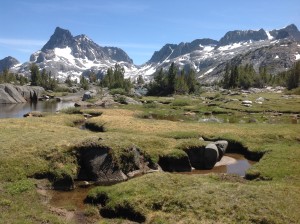Wilderness reminds us we’re not the center of everything
Fresno Bee, July 12, 2014 
I am writing this while hiking the John Muir Trail. The Sierra backcountry is beautiful and humbling. The wilderness reminds us that we are not in charge of the world.
When my children were young and we would go camping, I used to joke that after dark, the government turned off the rivers and waterfalls. We are so used to our civilized world, with its regular and predictable system of amenities, that city kids can make believe that rivers have on-off switches.
The wild world is, however, beyond our control. There are no on-off switches in the wilderness. The wind blows, the rain falls and bears come to camp. The marmots and mosquitoes go about their business. We like to think that we are the center of creation. But our narcissism is quickly corrected by a night under the stars. The Milky Way does not glow for us.
There is an old riddle about whether a tree that falls in the woods makes a sound. Of course it does. But usually only the deer and chipmunks hear it. Wild noises resound without any human presence. The birds don’t sing for us. Croaking frogs and chirping crickets don’t croon for our pleasure. And trees fall every day in hidden groves beyond human perception.
The natural world is profoundly indifferent to us. Even in your front yard garden, snails, weeds and worms are busy with their own lives. We work hard to control this wild vitality. But without constant vigilance, wild nature will soon destroy our handiwork.
The business of the birds and the bees proceeds without us. One day we saw two squirrels mating. We stopped to watch. But I felt somehow immodest. The squirrels live, mate and die here. We are just visitors, passing through their homes.
The wildflowers are blooming in the high country. We wandered through meadows rich with color. It is tempting to think that this beauty is on display for us. But flowers don’t bloom for human eyes. Like the squirrels, they are concerned with living and reproducing. Their beauty is not for us.
Not all wild things are charming or beautiful. The backpacker’s bane is the mosquito. These little vampires can quickly ruin a lovely campsite. But the mosquito’s bloodlust is not directed at us. If we were not passing through their habitat, they would find other prey.
One evening a bear came to camp. He sniffed us and circled our camp as we whistled and yelled, working hard to scare him off. I had the distinct impression that he was curious about us, wondering what these humans were doing in his home.
Some people do not to like wild things and wild places. A cold, windy, rainy night at 10,000 feet is no spring picnic. And sleep doesn’t come easy when you know that the bear knows where you are camped. But it helps to know that these wild things are just going about their own business. They do not intend to harm us. We merely happen to be in the way.
A philosopher and fellow backpacker once told me that he was more afraid of the other people he meets on the trail than he was of the snakes and bears lurking in the bush. Animals are merely wild, he explained. But human beings can be wicked.
Most of our fellow backpackers have been kind, generous and interesting. But humans demand recognition. The intensely human urge to be recognized by other human beings can lead to violence. Wars, rape and mass murder are human creations, malicious manifestations of the narcissistic need for recognition. Mosquitoes and bears only want a bite to eat. They don’t want to enslave, convert or conquer. Our species demands recognition, which leads to domination. That may be why we need governments. It may also be why we are so suspicious of them.
The backcountry buzzes and blooms without concern for human needs and interests. One lesson from this is humility, which deflates our vain desire to dominate and be recognized. The bears and bugs carry on without us. The rivers run without our permission. And the sound of falling trees is not made for human ears.

